- genevb's home page
- Posts
- 2025
- 2024
- 2023
- 2022
- September (1)
- 2021
- 2020
- 2019
- December (1)
- October (4)
- September (2)
- August (6)
- July (1)
- June (2)
- May (4)
- April (2)
- March (3)
- February (3)
- 2018
- 2017
- December (1)
- October (3)
- September (1)
- August (1)
- July (2)
- June (2)
- April (2)
- March (2)
- February (1)
- 2016
- November (2)
- September (1)
- August (2)
- July (1)
- June (2)
- May (2)
- April (1)
- March (5)
- February (2)
- January (1)
- 2015
- December (1)
- October (1)
- September (2)
- June (1)
- May (2)
- April (2)
- March (3)
- February (1)
- January (3)
- 2014
- December (2)
- October (2)
- September (2)
- August (3)
- July (2)
- June (2)
- May (2)
- April (9)
- March (2)
- February (2)
- January (1)
- 2013
- December (5)
- October (3)
- September (3)
- August (1)
- July (1)
- May (4)
- April (4)
- March (7)
- February (1)
- January (2)
- 2012
- December (2)
- November (6)
- October (2)
- September (3)
- August (7)
- July (2)
- June (1)
- May (3)
- April (1)
- March (2)
- February (1)
- 2011
- November (1)
- October (1)
- September (4)
- August (2)
- July (4)
- June (3)
- May (4)
- April (9)
- March (5)
- February (6)
- January (3)
- 2010
- December (3)
- November (6)
- October (3)
- September (1)
- August (5)
- July (1)
- June (4)
- May (1)
- April (2)
- March (2)
- February (4)
- January (2)
- 2009
- November (1)
- October (2)
- September (6)
- August (4)
- July (4)
- June (3)
- May (5)
- April (5)
- March (3)
- February (1)
- 2008
- 2005
- October (1)
- My blog
- Post new blog entry
- All blogs
Sector 5 anomaly
I have previously reported seeing issues in padrows 38-40 of sector 5 in Run 8 data (see T0s in Run 8 and the second half of Run8pp zerobias charge asymmetry ). Here are some further characterizations of the anomaly of these padrows obtained using track residuals from "StiPulls".
Looking at mean residuals (always shown in [cm] on this page) of long global tracks (>=35 hits) along the padrow in the dAu LowLuminosity data (runs 8348090 and 8348091) shows something of an up-down-up pattern at these three padrows:
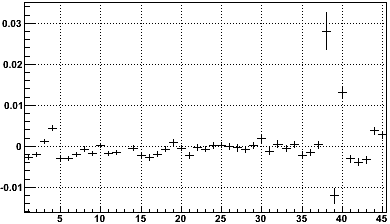
It should be noted that the spread for residuals in padrows 38-40 is also larger than it is for other padrows. This is somewhat reminiscent of the Sector 8 anomaly seen in 2006 which was in the end determined to be a single loose (floating potential) gated grid wire (in 2 places, near radii of 145 and 180 cm). That anomaly appeared like this in the uncorrected residuals:
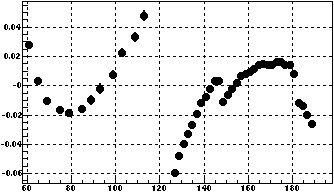
That problem was solved by flipping the polarity used on the gated grid for the outer part of Sector 8, and perhaps something like that could be tried in Run 10 is this is not understood by then. Regardless, plotting versus z should help nail this down. Here are mean residuals for padrows 35-45 in Sector 5 for Run 8 dAu LowLuminosity (first plot) and Run 8 pp high luminosity (second plot, mostly pile-up tracks):

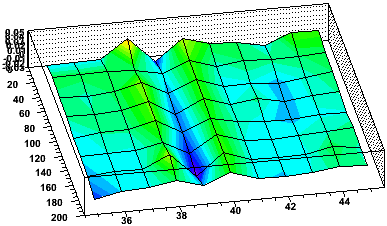
Interestingly, there appears to be neither a z dependence, nor a luminosity dependence. I have also examined some lower luminosity pp data (though not as low luminosity as the dAu LowLuminosity) and observed nearly the identical plot. Combined with only extending across 3 padrows, this evidence points against a single wire grid leak as for Sector 8.
Further, using the mean residuals in the z (drift) direction gives the following plots for the same datasets:
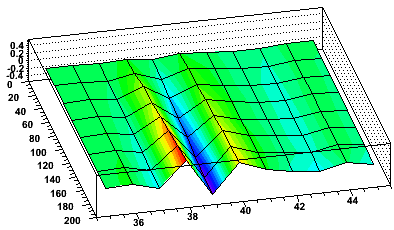
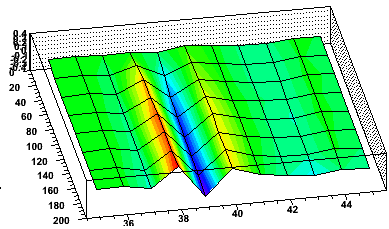
Again there appears to be no luminosity dependence, but a striking feature is the z dependence. Peculiarly, the z residuals go to zero for long drifts (z near zero), and are largest (nearly half a centimeter) for very short drift distances!
As yet I have no explanation for this behavior and welcome any input. Without further understanding, I propose to zero out these three padrows in Sector 5.
-Gene
- genevb's blog
- Login or register to post comments
